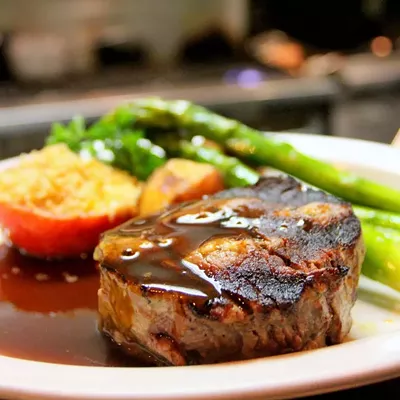Well, it isn't quite that easy, but it is a quick way to force characters into confrontation, and William Inge put the technique to good use in his 1955 comedy Bus Stop. Just outside Kansas City, a snowstorm strands eight people overnight in a diner, and even though this is the Midwest in the 1950s, the evening's dominant subject is sex. Maybe even love, but mostly sex.
The UA's Arizona Repertory Theatre has revived the play, once a great Broadway and cinematic success but now relegated mainly to community theaters. As this Brent-Gibbs-directed production shows, the play still holds up very well in all respects but one: In a script that has many interesting and subtle things to say about coupling, the two central characters are utterly repellant.
Bo is a bullheaded young cowboy who has enjoyed a one-night stand with a nightclub singer of dubious talent named Cherie, and he's taking her home to the ranch to get married, whether she wants to go or not. She does not, by the way. The unexpected layover is Cherie's chance to escape, except that at the moment there's no place to run to. She gets some assistance from the local sheriff (a reformed rowdy with the excessively symbolic name Will Masters), while her bus companions and the diner's waitresses look on, working on relationship issues of their own.
There's Carl, the bus driver, who's getting it on with Grace, the abandoned diner owner. And there's disgraced college professor Gerald Lyman, an alcoholic sexual predator ("lie-man," get it?) who's putting the moves on the bookish, enthusiastic and not incidentally underage waitress Elma. Meanwhile, Bo's best friend and surrogate brain, Virgil, tries to keep his pal out of trouble, remaining above the sexual fray.
So we have three kinds of relationships in play: romantic love (Bo and Cherie), except that Bo hasn't the faintest idea how to go about it; no-strings casual sex (Grace and Carl); and exploitive sex (Dr. Lyman and Elma). Plus uncommitted bystanders Will and Virgil, the latter being a man who, despite his kindness and decency, is doomed to be left out in the cold.
Inge manages his contrapuntal thematic lines expertly, except that he gives us absolutely no reason to care about Bo and Cherie. They're both stupid, and Bo's a bully. Aaron Shand as Bo and Julie Garrison as the nervous and birdlike Cherie don't or can't do much to elicit our sympathy for Bo's cattle-range loneliness or Cherie's white-trash disadvantages, so all we can do is hope that the other characters are more compelling.
For the most part, they are, even the underwritten role of Virgil (sensitively played by Matthew Bowdren). It's clear that he's the only person in the world who cares enough to keep the volatile Bo out of trouble, and there's a very subtle dynamic between the two that suggests it would be more interesting for everyone concerned (including the audience) if these cowboys got a little Brokeback on us. Alas, that is not possible.
More interesting is what's going on with Dr. Lyman, and Jeremy Selim plays this overblown character to the hilt; Selim has far more experience than the other cast members (they're students), and it shows. His Lyman is a comic-tragic figure who spouts off grandly about Romeo and Juliet but denies himself love because he fears surrending to another person. Selim's portrayal of the sympathetic predator is nicely complicated, and from moment to moment he keeps us guessing whether Lyman is an intellectual ruined by drink, or a drunk ruined by intellect.
Celia Madeoy makes Grace a woman of strength, not just convenience, and Shannon Corrigan gives an engagingly game performance as Elma. Will, the lawman, is played by Nate Weisband, who was very good last season in the UA's Betrayal and Beowulf Alley's Of Mice and Men, but inconsistent in Invisible Theatre's Letters to Sala; here, as at IT, Weisband is curiously uneven, his line readings ranging from well-nuanced to mechanical.
Katie Alvord's set design captures the time and place perfectly, as do Shelby Rodger's costumes, and Derek Warrick's lighting ably supports what's going on inside the diner and out.











